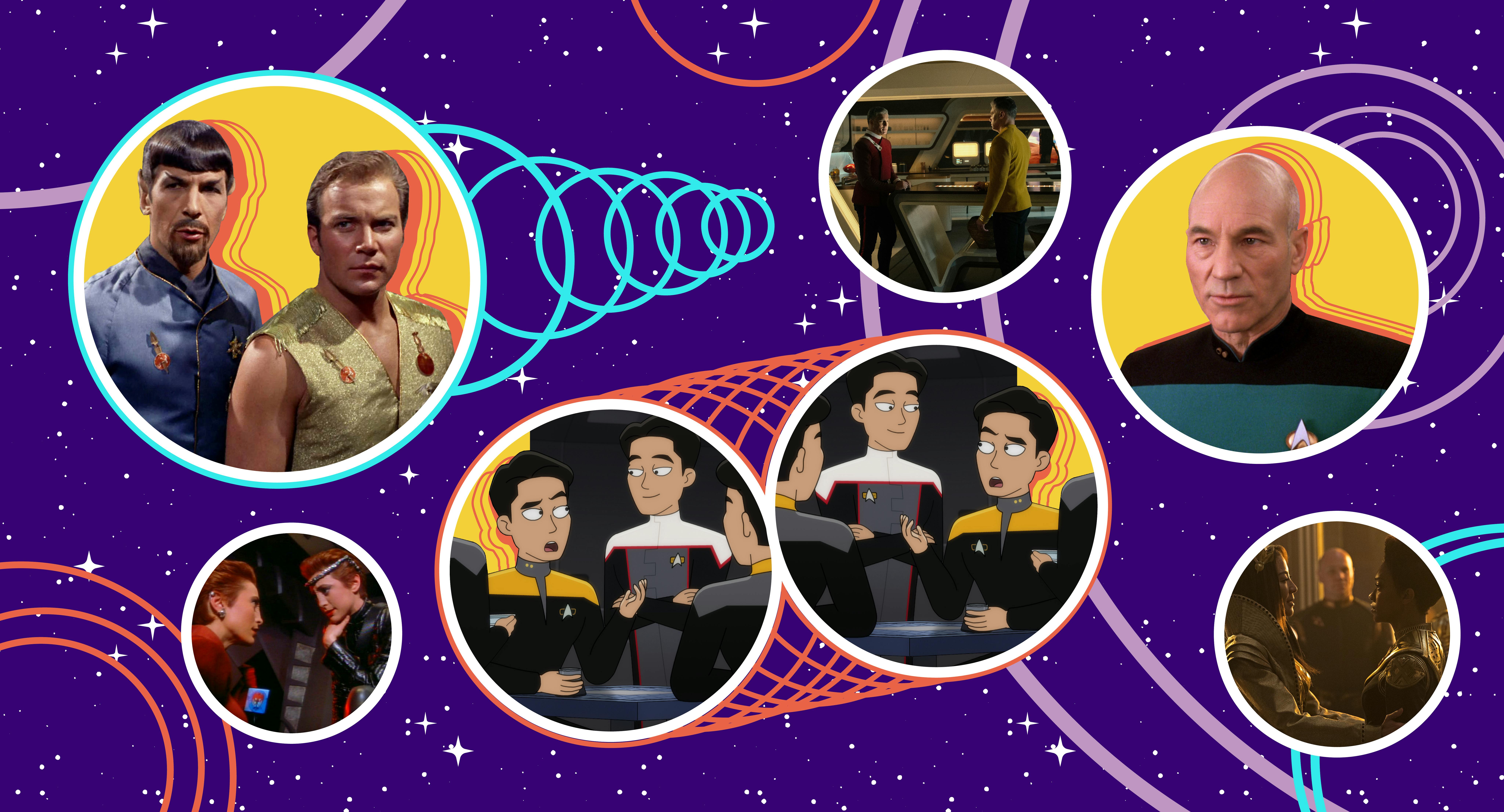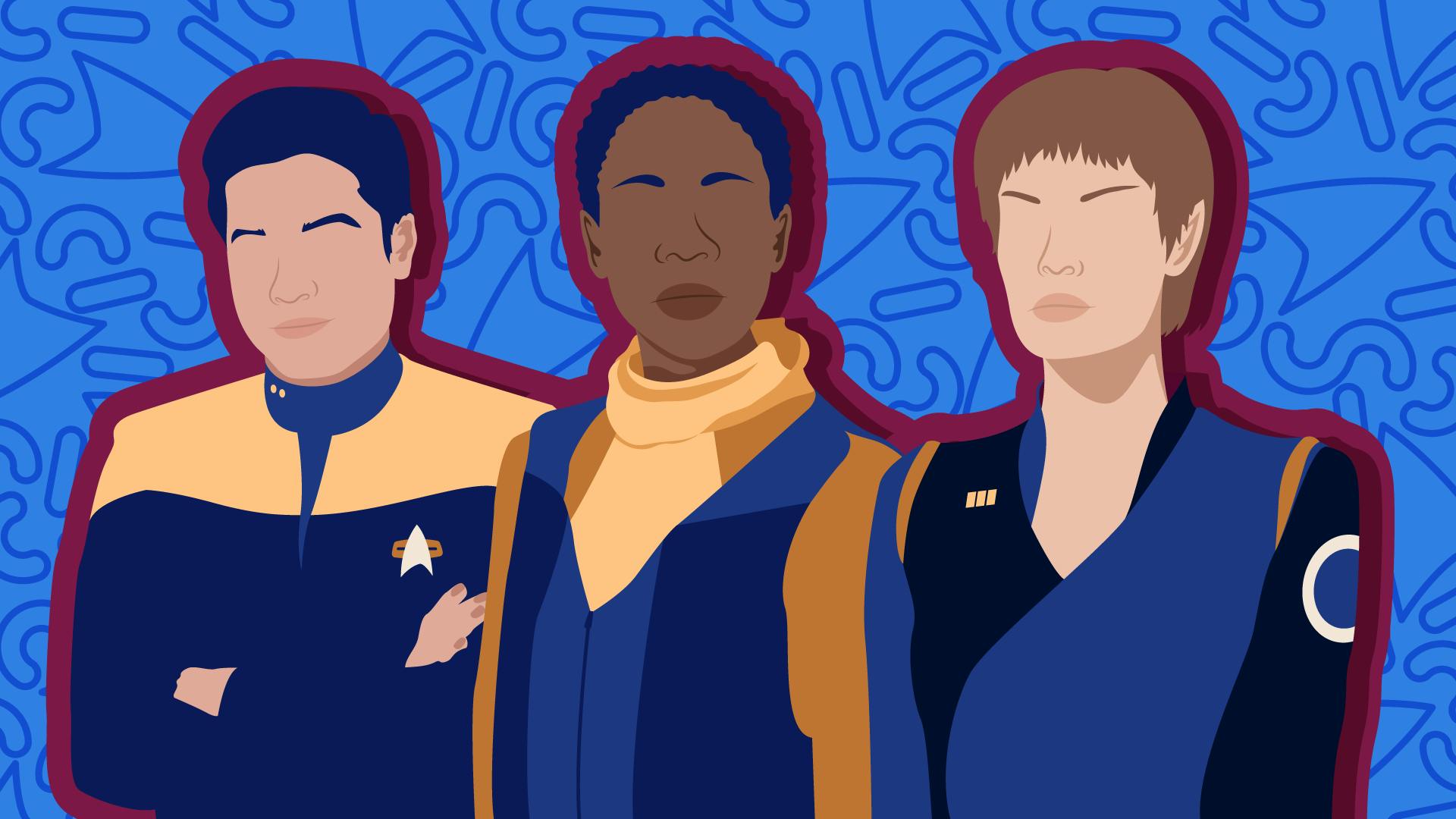Published Sep 27, 2023
How Twain Made His Mark on Star Trek
We reflect on how 'The Next Generation' two-parter honors the life and mind of Samuel Clemens.
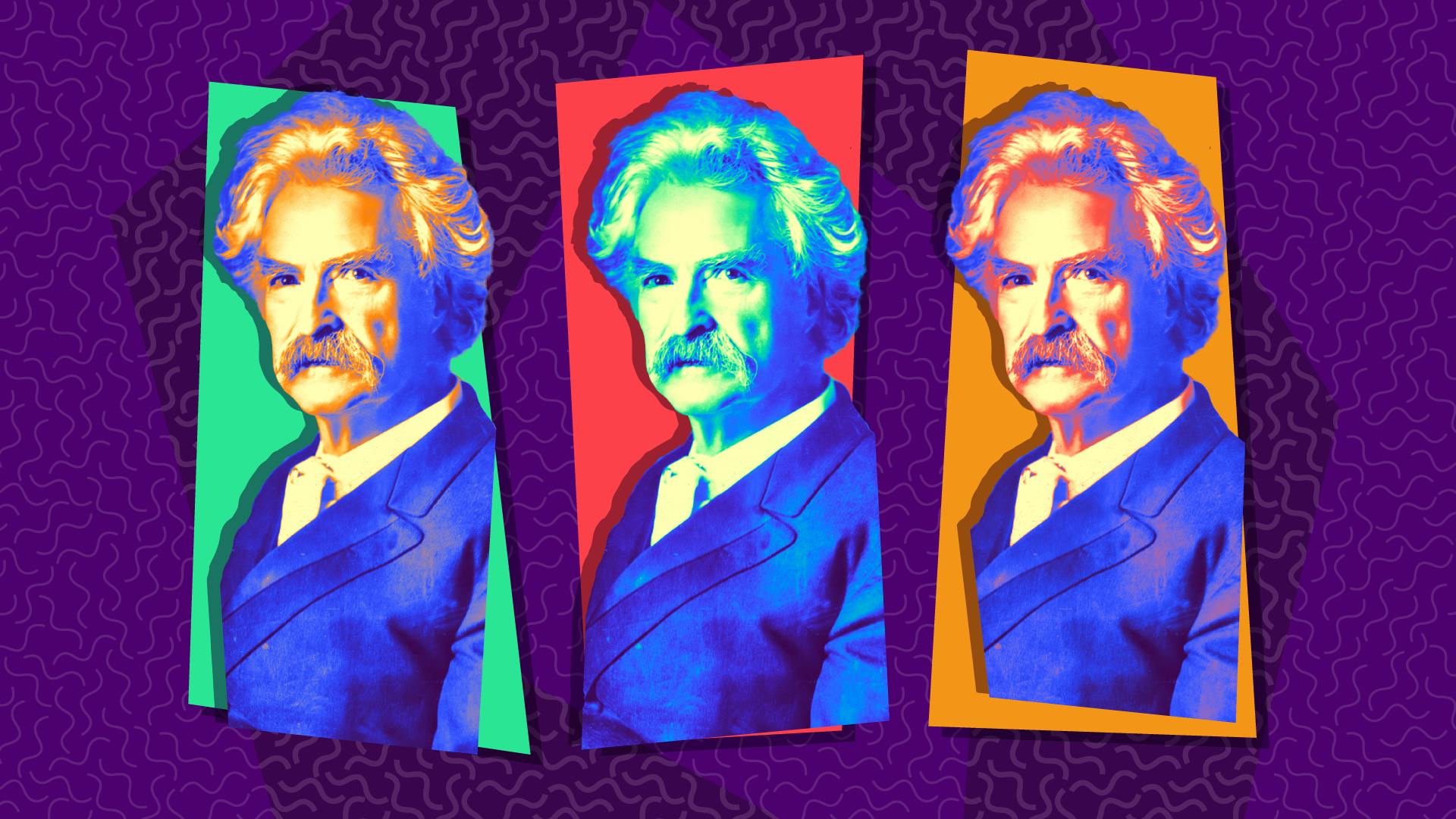
StarTrek.com
Star Trek is a worldwide phenomenon. StarTrek.com occasionally presents excerpts from issues of Star Trek Magazine, which is published out of England and available internationally. And, as readers know, we also occasionally run theme pieces and interviews featured in Inside Star Trek Magazine, the official Star Trek magazine of Italy.
With the recent anniversary of the popular episode, "," which debuted on September 21, back in 1992, we thought today would be great timing to run the following Inside Star Trek Magazine feature by Gabriella Cordone, which extensively examines the nuances and implications of the appearances by Samuel Clemens/Mark Twain (as played by Jerry Hardin) in the "Time's Arrow" two-parter. The story as follows has been translated from Italian into English by the magazine's editor.
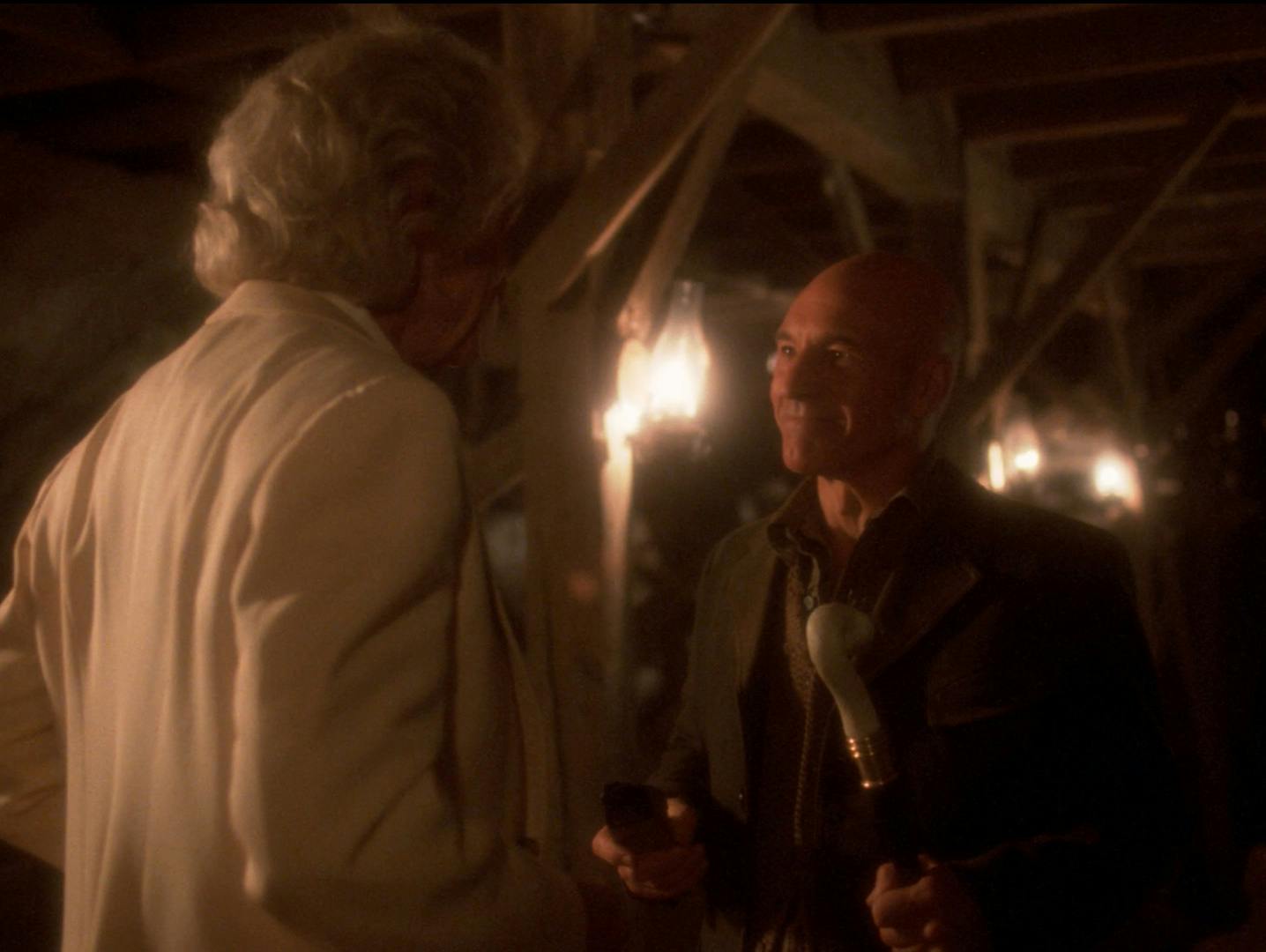
"Time's Arrow, Part II"
StarTrek.com
I wish I had more time to know you, Mister Clemens."
"Just read my books. I assure you there is a lot of me in them.
Jean-Luc Picard and Samuel Clemens, "Time's Arrow, Part II"
With this simple dialogue, the captain of the Enterprise-D takes his leave of the famous character guest of one of the most intriguing episodes of Star Trek: The Next Generation. An episode where the character of Guinan, played majestically by Whoopi Goldberg, is essential and is at the focus of the temporal paradox, in which our heroes end up in 1893’s San Francisco, where they meet (indeed!) Samuel Clemens, aka Mark Twain. We are talking about “Time’s Arrow,” the two-part episode that kept fans in suspended animation for three months between Season 5 and 6.
Maybe the most famous American literary author, Mark Twain is part of our collective children imagination because everyone has read Adventures of Huckleberry Finn or the book that today we would call its “prequel,” The Adventures of Tom Sawyer, and unquestionably we had, among our bedtime stories, maybe in one of its abridged editions, The Prince and the Pauper. If these titles don’t strike a memory (but I strongly doubt it) then perhaps, being science fiction fans, you might at least know A Connecticut Yankee in King Arthur’s Court, which is often said to be the forerunner of all science fiction tales about time travel.
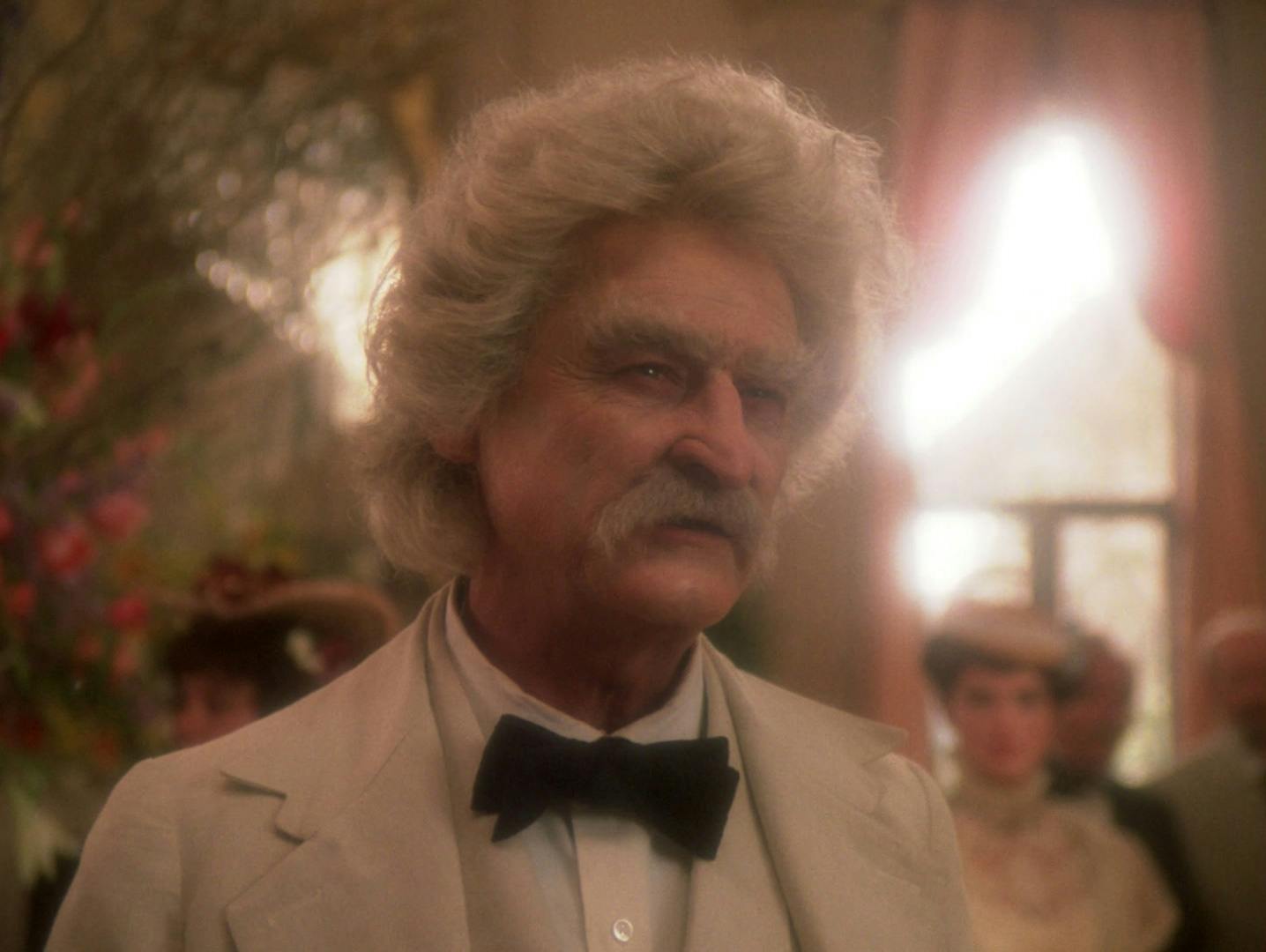
"Time's Arrow"
StarTrek.com
What certainly escapes children’s minds but becomes (with second readings once we’ve grown-up) obvious is the allegorical and sarcastic nature of Clemens’ writings, whose four titles we mentioned are just the most famous ones. His attitude of impudent offense on the whole humanity (which Clemens attacked subtly in his books but overtly in his conferences) was mitigated by his stubborn spirit of defense of the common people.
We can theorize that this attitude of his grew out of experiences he lived during the first years of his life. At the early age of 13 (after his father’s death), Samuel had to leave school to start working. At the time he lived with his family (he was the sixth of seven brothers and sisters, although not all of them survived childhood) in the little town of Hannibal, along the Mississippi, and his first job was a printer apprentice. Two years later, he became printer and editorial assistant in the same newspaper where his brother Orion worked. It was there and then, surrounded by the most various reports (local news and travelogues, political columns and reports on the international situation), that Samuel Clemens started his adventure as a writer, although he would not publish anything for a long time yet.
Clemens moved to the greater city of St. Louis and found another job as a printer, but soon he left his job to start a real adventure. A small adventure, we must say — he started to pilot merchant boats over the Mississippi — but enough to get him in touch with a variety of different people, and to give him a little touch of the sense of discovery and the wonder of travels.
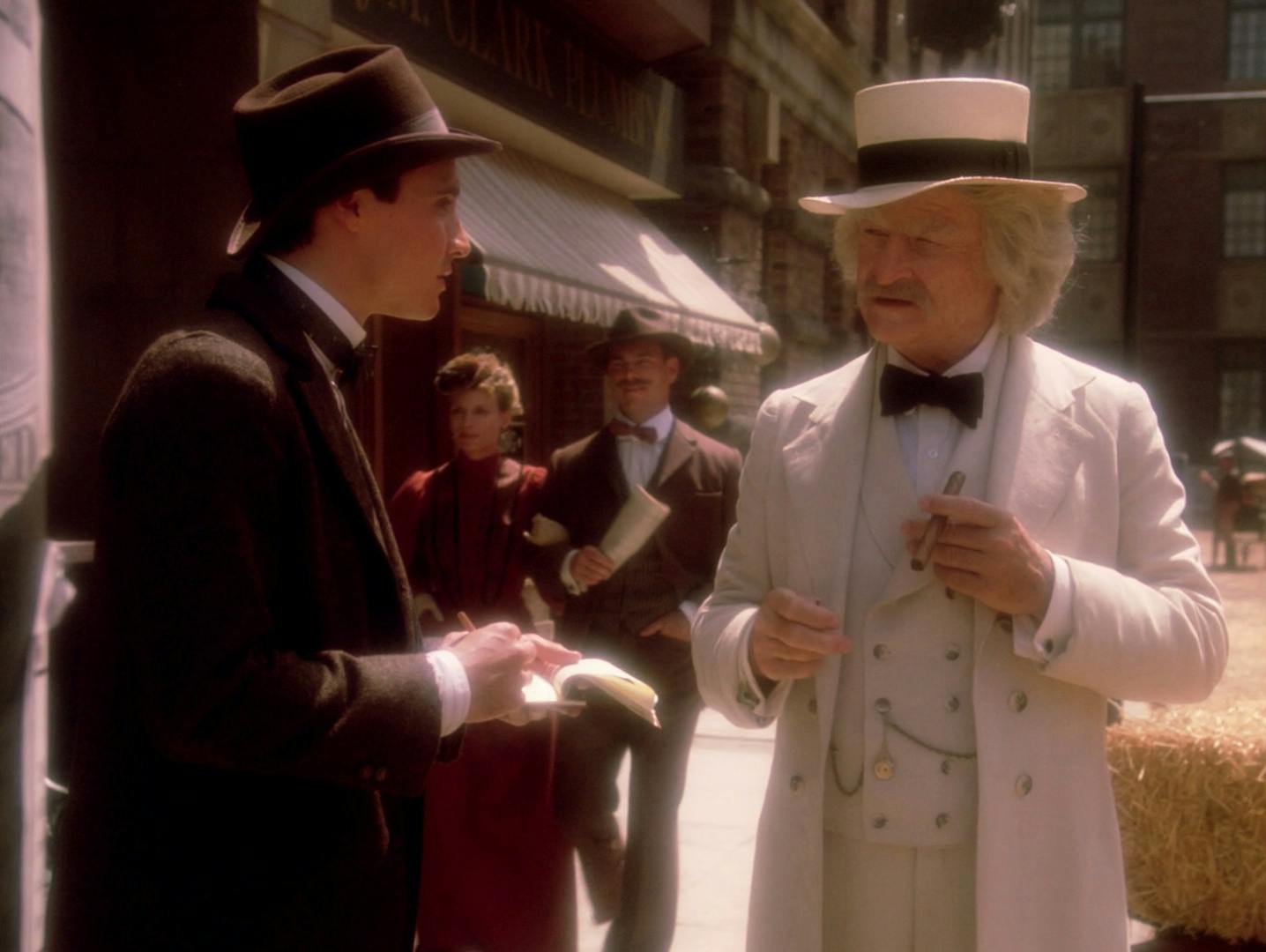
"Time's Arrow, Part II"
StarTrek.com
It’s during that time that, sailing on the biggest river of the North American continent, Clemens got entangled with an event that marked his entire life as it marked the United States history itself — the Civil War, sparked off around slavery.
Samuel Clemens stopped working on boats (the war was a lethal blow to commerce) and started to be a war correspondent for various newspapers.
In April 1865, the Civil War ended and in the same year, in December, slavery was declared illegal. Only a few weeks before (in November) Samuel Clemens published his first tale, The Celebrated Jumping Frog of Calaveras County, by the pen name of Mark Twain (chosen from the jargon learned aboard the Mississippi boats). The success was big and unexpected, and from that moment on — helped by about thirty novels and novelettes and a great number of articles — Mark Twain became perhaps the most famous and celebrated writer in America.
He loved humanity and because of this, he was its most ferocious critic. Clemens was, as we saw, always fascinated by adventures. But maybe a few might know that he was also a fervid fan of science and technology, and that he himself patented some inventions (including a scrapbook with pages spread with a dried adhesive that you could moistened to use, like that on stamps).
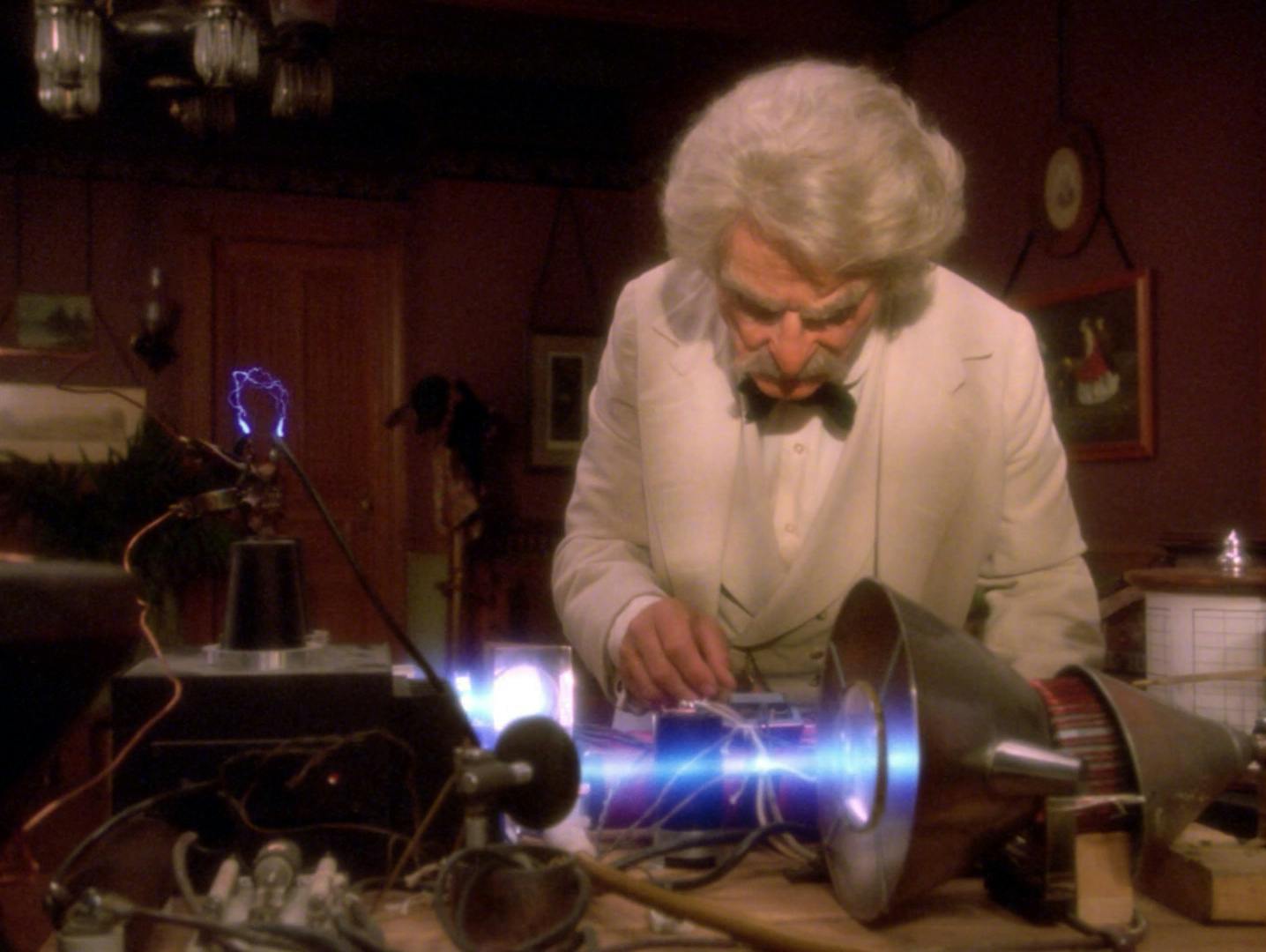
"Time's Arrow, Part II"
StarTrek.com
Clemens was a close friend of Nikola Tesla and Thomas Edison, and he often spent hours in their laboratories watching the inventors of his days; although, he probably didn’t witness the world-famous fight that saw them as adversaries (the so-called “War of Currents”). Edison is credited with having shot the few real images of Clemens on film, since he shot the writer twice, one being the short film inspired to his novel The Prince and the Pauper.
Clemens’ passion for innovation was not always just a healthy curiosity; once he was pushed to risk his own money (and part of his wife’s) in an enterprise that was (unfortunately for him) a real failure — he invested in what he believed to be the device that could revolutionize the printing system. The Paige Compositor should have indeed substituted the job of printers, who back then were composing a text with movable types letter by letter, but the device was not reliable and the fact that it should have been monitored by a printer to correct its errors made it commercially unsuccessful. In the same period of time was the invention of the Linotype, a device that did the same thing but worked well. So the Paige Compositor was the main cause of Mark Twain’s bankruptcy.
As a marginal note, it should be stated how much this unfortunate adventure underlined once again Clemens' protective attitude towards the poor; despite his bankruptcy, he had no legal obligations toward his creditors. In the following years, the writer tirelessly worked to repay them until the last cent.
All that demonstrates that the portrait of Samuel Clemens, pen name Mark Twain, depicted in “Time’s Arrow” is accurate and faithful to the real personality of the writer. So it’s not surprising to see him easily accept the existence of beings from other worlds, alien technologies, and incredible progress. In the story, written by Joe Menosky and scripted along with Jeri Taylor and Michael Piller, Samuel Clemens personality is clear — his sarcasm, his sagacity, his curiosity to the point of gossip, and the passion for the unknown are all there.
The episode is set when Clemens was 58, at a time when the writer was going around the world hosting literature conferences and meetings. His childish curiosity (beautifully played by Jerry Hardin) is a perfect counterpart to Data — the two compete for the prize of the most nosey parker, but while the android interest is driven by reason (finding out what’s happening, and make it happen again), Clemens goes from the simple will of tittle-tattling to the wish of wanting to know what’s — really! — in store for humanity in the future.
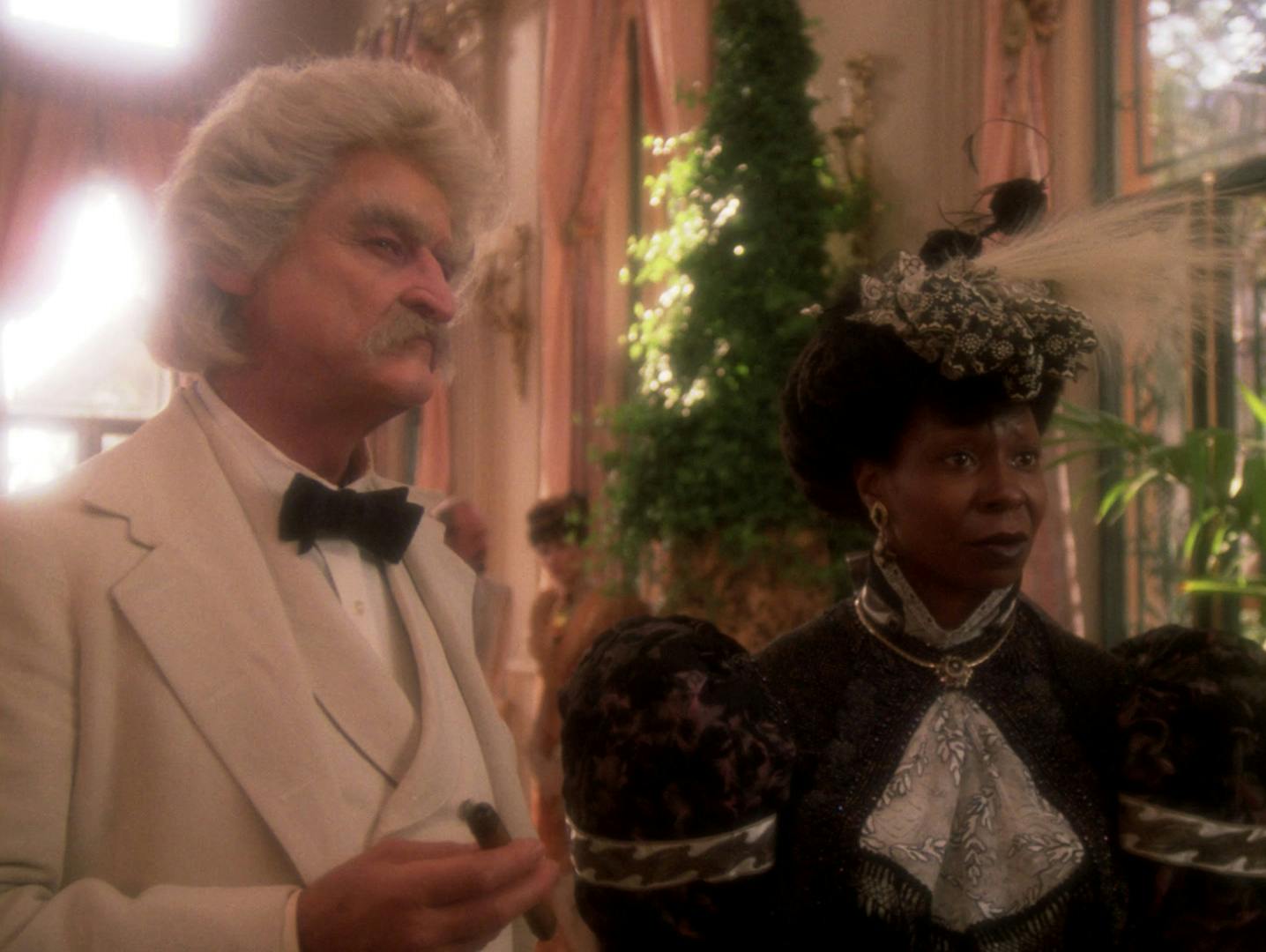
"Time's Arrow"
StarTrek.com
But if the Earth is not alone, and there are millions of inhabited planets in the heavens."
"Quite my point. Man becomes a trivial creation, does he not? Lost in the vastness of the cosmic prairie, adrift on the deep ocean of time. A single one among countless others."
"Someone may argue that a diamond is still a diamond, even if it is one amongst millions. It still shines as brightly."
"Someone might say that, dear lady, if someone thought that the human race was akin to a precious jewel. But this increasingly hypothetical someone would not be me.
Guinan and Samuel Clemens, "Time's Arrow"
After a few minutes, another side of Clemens' love/hate for humanity surfaces. After he eavesdropped on Data and Guinan, discovering that they are somehow plotting something, talking about things he fails to understand, Clemens stands up as a paladin of Earth and starts to want to know everything about the pale man called Data.
Clemens’ fear is the one he described in the famous A Connecticut Yankee in King Arthur’s Court. The book is actually mainly a satire of Clemens’ contemporary world, but the reference made in the episode defines the attitude of defense of the writer, who doesn’t want his world and his people (humanity) to fall prey to future men who seek destruction. This attitude of “guardianship” permeates the character in the whole episode and reaches its climax when he confronts Picard, Data, and the rest of the crew with a gun, ready to defend the right to know and understand, and firm on his belief that every man is a representative of the whole humanity, and as such has the right and duty to intervene when he believes he’s witnessing injustice.
His scientific curiosity though, the one of the writer wanting to know the unknown, prevails and Clemens doesn’t hesitate for a moment to jump into action — a bright portal where humans are disappearing into nothingness would drive many of his contemporaries to run in fear, while he is pulled by it because of his curiosity, and drives him to jump beyond that unknown threshold.
When he arrives in the 24th Century, without surrendering to shock, and with the proud tone of one who demands an explanation, he asks—
Where are we? And when?"
"This is the 24th Century. We are on Devidia II, and you're not supposed to be here."
"Well, it seems to me I have as much right to be in your time as you had in mine. I wanted to see how you conducted my future affairs."
"Your future affairs?"
"The affairs of mankind.
Samuel Clemens, Will Riker, and Deanna Troi, "Time's Arrow, Part II"
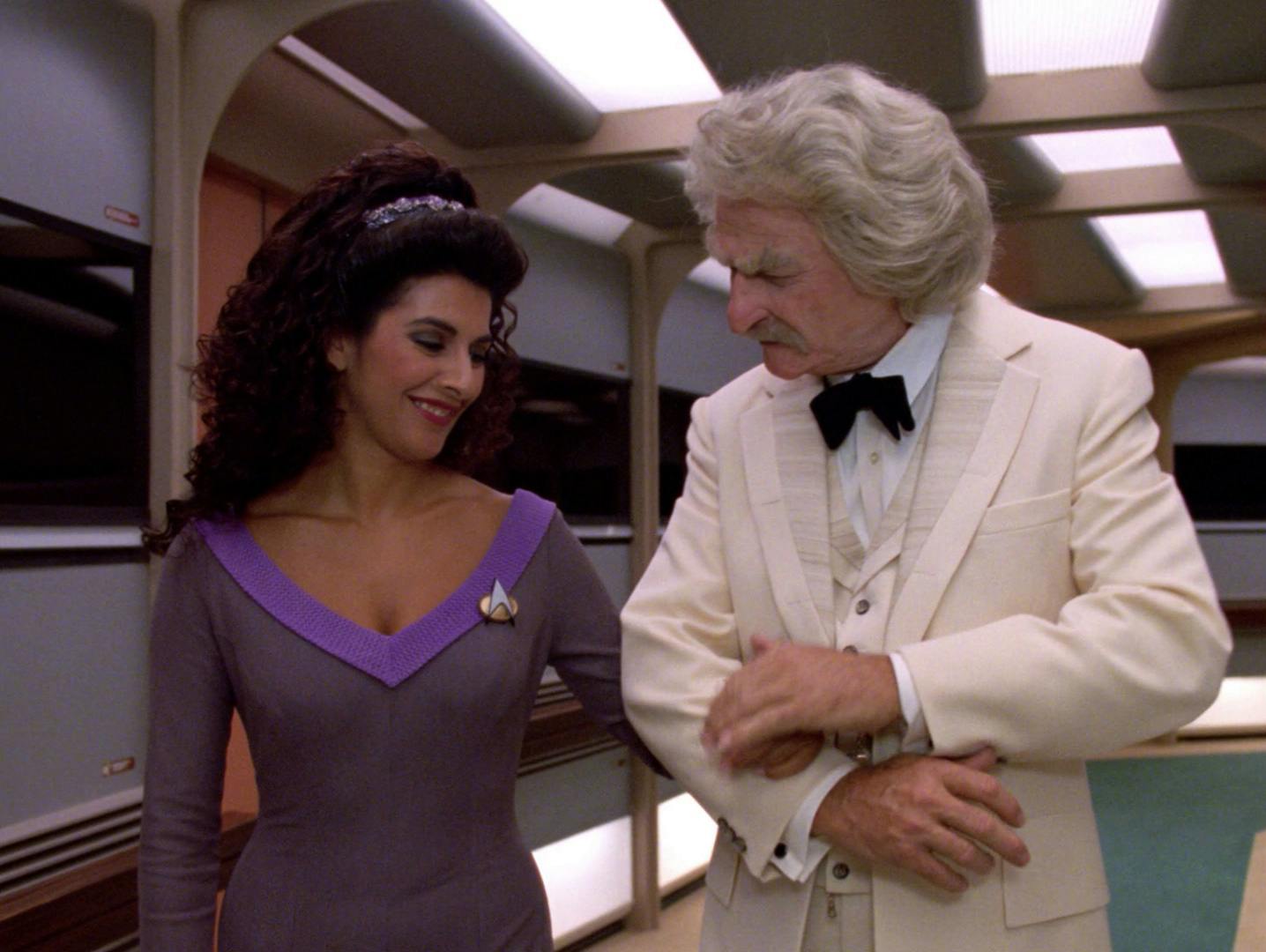
"Time's Arrow, Part II"
StarTrek.com
Obviously Clemens finds out that the future is not as bad as he thinks.
At first, he is puzzled, and troubled, by little pleasures that are missing (a cigar rolled by hand, the pleasure of opening a door for a beautiful lady), but going around the ship with Deanna, he realizes that the future is not so bad. His theory that future beings are willing to go back to the past just to bring bedlam and pain is correct; but the villains are not Men, they are aliens. He also discovers that many of his era attitudes have disappeared in the utopian and optimistic future created by Gene Roddenberry —
Young lady, I come from a time when men achieve power and wealth by standing on the backs of the poor, where prejudice and intolerance are commonplace and power is an end unto itself. And you're telling me that isn't how it is anymore?"
"That's right."
"Well, maybe it's worth giving up cigars for after all.
Samuel Clemens and Deanna Troi, "Time's Arrow, Part II"
Twain realizes that he misjudged everything — the situation, the people he met. He apologizes to Data (whom he never considered less than a person, although an odd one!), and at the end of his adventures, he gladly thanks the android, “for starting me out on the greatest adventure a man's ever had. And for helping a bitter old man to open his eyes and see that the future turned out pretty well after all.”
Clemens volunteers to go back to his time in order to bring back Captain Picard, and he succeeds in the nick of time, saying a quick goodbye to the Enterprise captain.
The final scene, where Clemens leaves his watch beside Data’s head, demonstrates how much the character of the TNG episode (who as we saw is very similar to the real man) has understood the complex temporal mechanism that states that what’s happened must happen again.
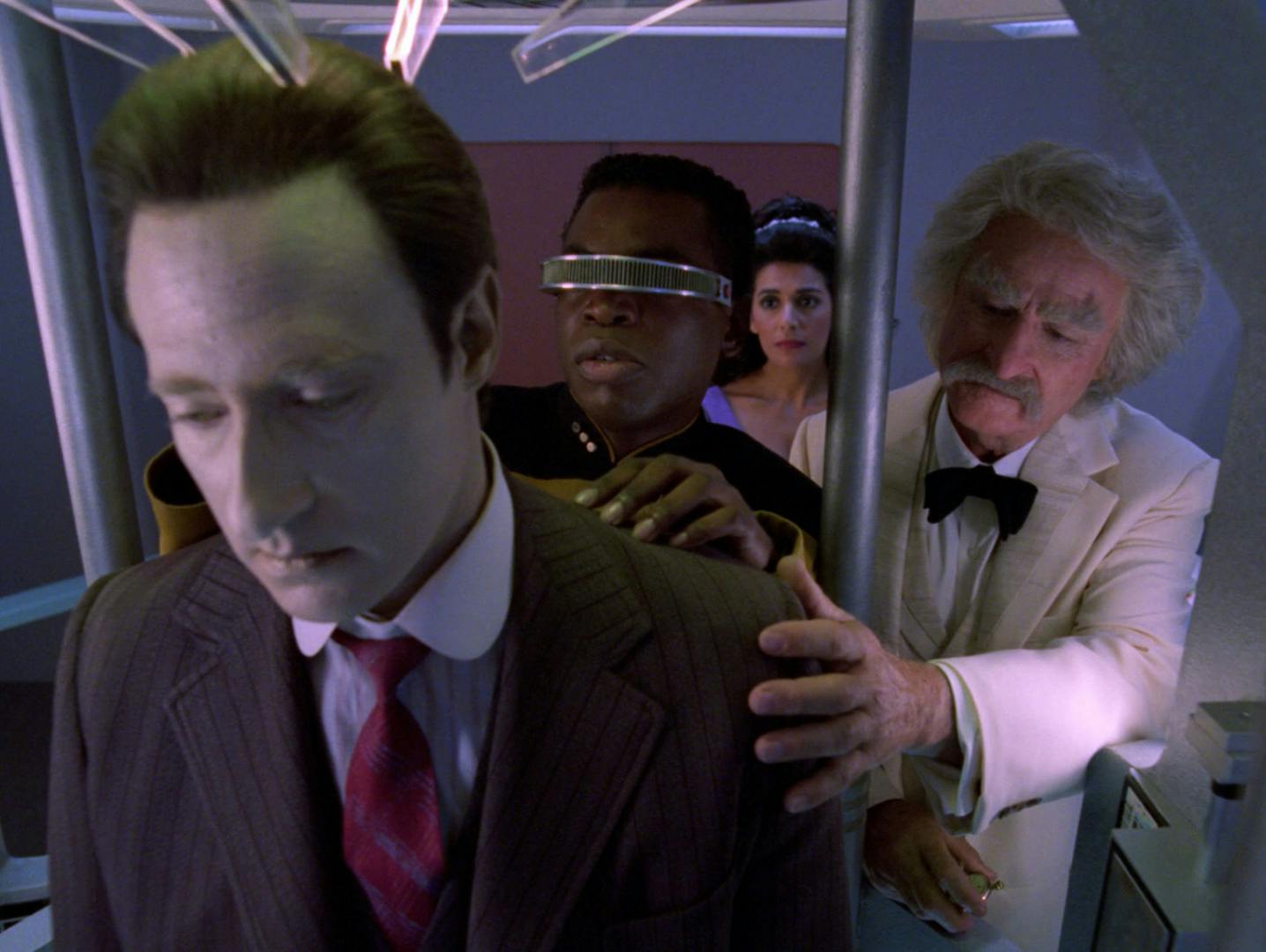
"Time's Arrow, Part II"
StarTrek.com
We don’t want to close out this article remembering that scene. I would like to do it with another moment, a very short one, that mentions a strange historical coincidence linked to Samuel Clemens, pen name MarkTwain.
When he is about to start the Enterprise tour with Deanna Troi, Clemens exclaims, “You ever run into Halley's comet?” The doors of the transporter room close like a curtain on this line, seemingly incidental; but that’s not incidental at all. Halley’s Comet is indeed a sort of strange fil rouge that accompanied the birth and death of Samuel Clemens.
It was visible in the sky on the day he was born, November 30, 1835. The comet, which makes a pass near Earth only every 75 years, was also in the sky on the day of his death, April 21, 1910. Clemens was aware, obviously, of this strange fact, and it is reported that in 1909, a year prior his own death, he said—
I came in with Halley's Comet. It is coming again next year. The Almighty has said, no doubt, 'Now there are these two unaccountable freaks; they came in together, they must go out together.'
Samuel Clemens
Of course, it was a coincidence, but it is certainly one of those coincidences that give the aura of a legend to a character who is already, per se, one of the greatest literary myths of all time.
